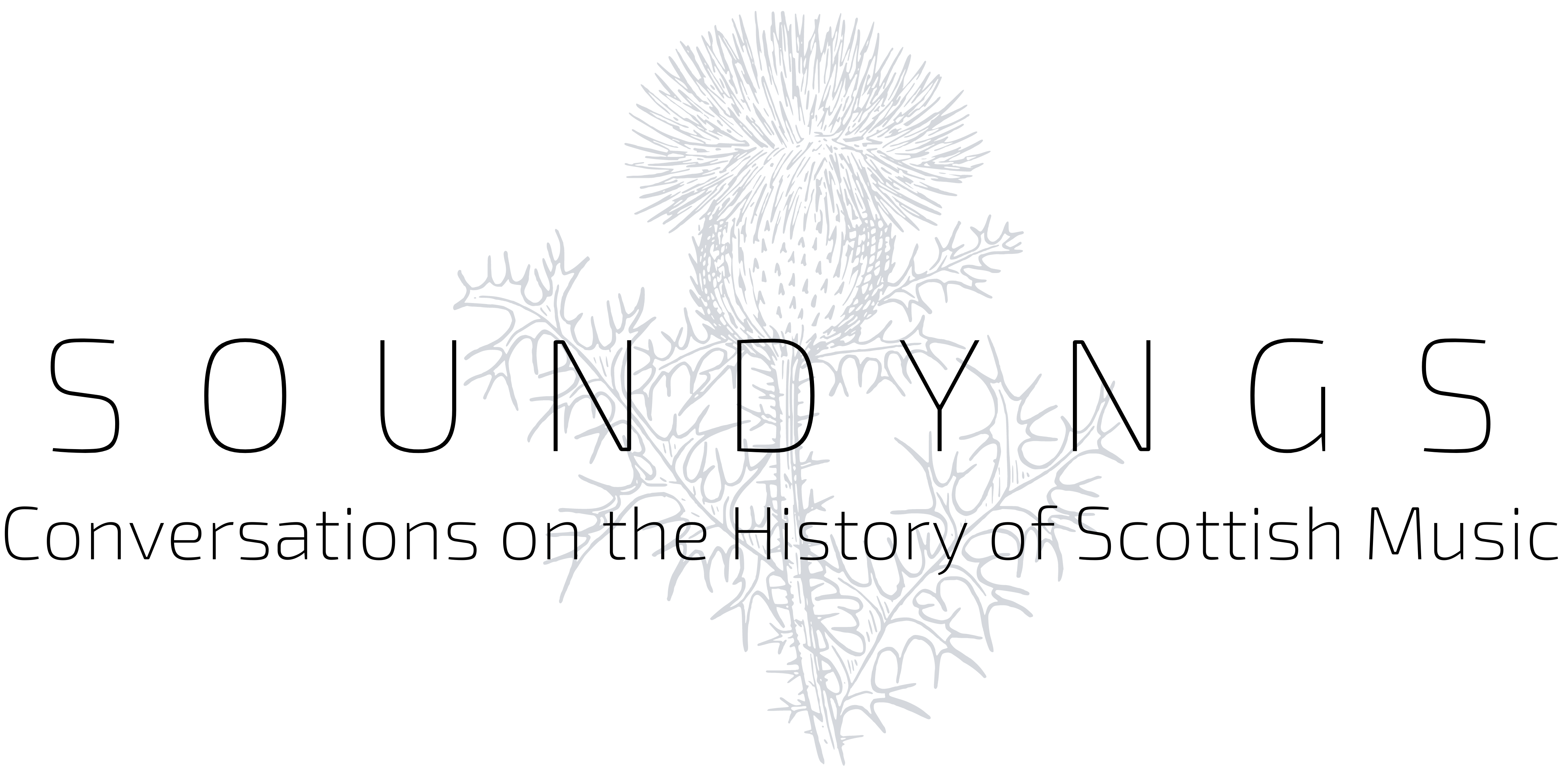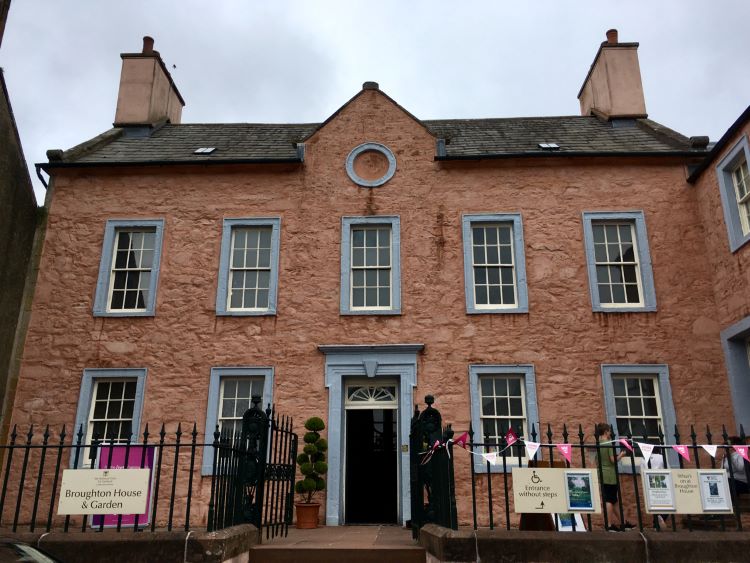Featured Image: Broughton House, photograph by Lorna M Campbell, CC BY-SA 4.0, via Wikimedia Commons
Soundyngs went to Galloway this summer, and heavens, there is a lot of beautiful countryside there, but one of the highlights was a visit to the Hornel library in the National-Trust for Scotland’s Broughton House in Kirkcudbright and its collection of ballad manuscripts.
Edward Hornel (1864-1933) was one of the “Glasgow Boys” painters, and in the early years of the 1900s built up an impressive library of material relevant to Robert Burns: cultural contexts and precursors, Burns himself, his legacy, and anything tangentially connected with songs and poetry. One area of cultural strength that attracted his attention was the ballad or “muckle sang” repertoire.
The library has two particular manuscript treasures: the Macmath manuscript, and the Mansfield manuscript.
William Macmath and Francis James Child
William Macmath (1844-1922) was one of the main Scottish collaborators in the ballad collecting work carried out by Harvard academic Francis James Child (1825-96).
Child’s English and Scottish Popular Ballads (Boston and New York: Houghton, Mifflin and Co., 1882-98) are an 8-volume anthology of songs from England, Scotland and in some cases North America, collected in the late 19th century. Child consulted many printed broadside and chapbook collections, but also worked with people with expert local knowledge of songs and sources – one of whom was William Macmath. Macmath was from a Galloway family; although he was not an academic, he was a serious scholar: a Fellow of the Society of Antiquaries of Scotland (1867-) and a founder member of the Edinburgh Bibliographical Society (see Miller, 1924).
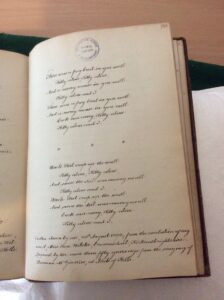
Image 1: Macmath M/S vol.1 p.95 ‘There was a frog bred in yon well’, originally sung by Jane Webster (author’s own photograph)
The Macmath manuscript in the Hornel library in Broughton House has some 56 song lyrics, a few taken from previous written sources, but mostly carefully transcribed from a variety of oral sources. In the latter instance, lyrics are accompanied by notes about the singer, and who they learnt from, where the song was transcribed, and when. Letters to Child showed Macmath compared his transcriptions with versions found in collections by authorities such as Hogg and Walter Scott, highlighting cases where their editing might have been laced with artistic license rather than care for the oral tradition. Dumfries, Newton Stewart and Kirkcudbright also had local printers, and Macmath was also drawing on local limited-run publications, many of which are also held in the Hornel collection.
Quite a few of the songs in Macmath’s manuscript were transcribed from Macmath’s aunt, Miss Jane Webster, “formerly of Airds of Kells in the Stewartry of Kirkcudbright”, latterly resident (like Macmath) in Edinburgh, who clearly had a capacious memory for the names of the people who taught her this repertoire. Macmath’s sister, Minnie Macmath, is also named for several songs, Women were clearly important tradition-bearers in this family.
Macmath sometimes includes notes about the local background for less familiar ballads. For example, on a song about Maxwell of Straquhan, Macmath notes that this man was a hunter who drowned in the river Fleet in 1699, and that ‘yelpers’ referenced in the song were Maxwell’s dogs, which ran off and were to be heard barking at night in the years following the disaster (Macmath, p.63). The whole poem, Macmath noted, could also be found a local anthology of Fugitive Pieces (Kirkcudbright: Jell McCulloch, n.d):
The night was dark, the water stark,
And none to help the man,
Sae death accost, and sae was lost
Brave Maxwell O’ Stra’han. (Macmath, 63-64).
Macmath’s handwriting is beautiful – not all manuscripts are so easy to read! The collection is mostly just of song lyrics, but towards the end of the collation, Macmath included some transcriptions of tunes which are included below in case anyone wants to sing them.
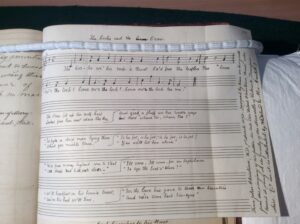
Image 2: Macmath M/S vol.1: Music for ‘The Corbie and the Craw’
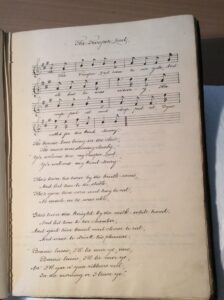
Image 3: Macmath M/S vol.1: Words and Music for ‘The Trooper Lad’
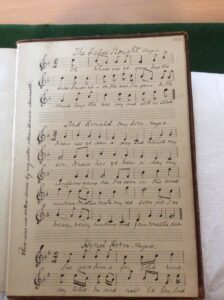
Image 4: Macmath M/S vol.1 p.113
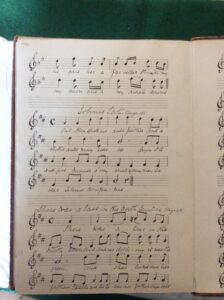
Image 5: Macmath M/S vol.1 p114
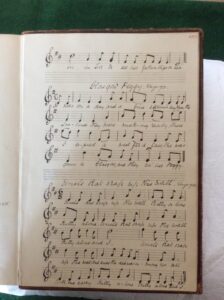
Image 6: Macmath M/S vol.1 p.115
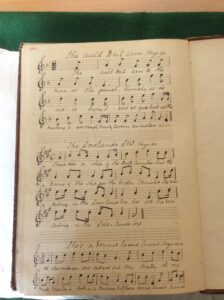
Image 7: Macmath M/S vol.1 p.116
Afterword: Macmath: the Silent Page, made to sound again
In 2015, a super-band of traditional musicians led by (then) Galloway-based Alison Burns recorded a CD of songs from the Macmath manuscript, going to the source to find versions of songs that were either unique to Macmath’s manuscript or relatively rare in the recorded ballad repertoire. The result, Macmath: the Silent Page, is a very attractive album including some new tunes written for lyrics that otherwise didn’t have known tunes and a wealth of different folk instruments. Enjoy!
Further Reading and Listening
- Ballads and Songs Collected by William Macmath – 2 volumes of manuscripts, Hornel AC 14034 MS 3-22.
- Broughton House and the Hornel Library – National Trust for Scotland Visitor Page
- The Macmath Collective (Aaron Jones, Ali Burns, Claire Mann, Emily Smith, Jamie McClennan, Robyn Stapleton and Wendy Stewart), Macmath: The Silent Page CD (2015) – nb the original project page linking to the Dumfries Arts Festival no longer supplies CDs – I got mine from White Falls Records
- Frank Miller, The Poets of Dumfriesshire (Glasgow: J Maclehose and Sons, 1910)
- Frank Miller, William MacMath (1844-1922): A Biographical Sketch (Dalbeattie: Thomas Fraser, 1924)
- William Montgomerie, ‘William MacMath and the Scott Ballad Manuscripts’, in Studies in Scottish Literature 1(2), 1963, pp.93-98
To read Soundyngs Post 2 on Broughton House click here [live from 18th September]
